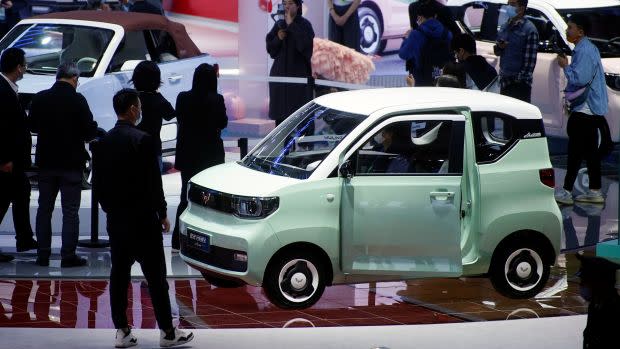China is trying to put the brakes on Tesla’s biggest rival

For months, a budget Chinese EV that’s popular with Gen Z has been outselling Tesla in China. This situation could change soon.
Shanghai, which is home to Tesla’s Chinese factory, has stopped issuing free license plates for EVs priced under 100,000 yuan ($15,560), according to local dealers and Chinese media reports. There has been no official announcement yet, but it could come in the coming weeks, according to the South China Morning Post. The policy, if it becomes permanent, could cause a problem for the Hong Guang Mini, a small, boxy EV priced at around $4,400.
How license plates work in China
A Shanghai-based Hong Guang Mini dealer told Quartz that currently, the car could not get new licenses in the city—they have no information on why the decision has been made, or when the issuing might resume. The car’s maker, SAIC-GM-Wuling Automobile—a joint venture between state-run car giant SAIC, General Motors, and Guangxi Automobile—also confirmed the news to Chinese media outlet 21 Caijing, but said they have not received official notices yet.
In big Chinese cities including Shanghai, residents have to go through lucky draws or auctions to get a car license plate—a way for authorities to curb congestion and air pollution. A plate can cost as much as 100,000 yuan ($15,566). But to encourage cleaner transportation, Shanghai was issuing free license plates to EV owners from 2013, on top of state subsidies for green vehicles.
As such, many users have purchased the Hong Guang Mini not only because of its low price point, but also the license plate attached to it. Beyond the Hong Guang Mini, China has another 30 or so budget EV brands that could also be affected by the change.
Hong Guang Mini vs. Tesla
The car has been beating Tesla since its launch in July last year, partly thanks to young buyers attracted by its fashionable design. In January, the company sold 36,760 Hong Guang Mini EVs, according to Sweden-based EV-Volumes data, while Tesla sold only 16,521 cars during that period, according to the China Passenger Car Association. The Chinese EV maintained its lead in March with 39,745 vehicles sold, compared with 34,635 for Tesla. The Hong Guang Mini may even be the world’s best-selling EV.
With this new license-plate policy, Shanghai could be trying to encourage local EV makers to improve their competitiveness by setting the bar higher for industry entrants, say analysts. “They [the authorities] are trying to put China in the global game for EVs, and if you end up serving only the low-end market you end up recreating India, where the [EV] companies are only built for the domestic market,” says Bill Russo, CEO of Shanghai-based consultancy Automobility.
Is Shanghai too crowded for thousands of new EVs?
Another reason could be the fast growth of EVs in the city, where around 120,000 new energy cars were sold last year, representing a 92% jump from 2019. The increasing number of green vehicles hitting the road naturally adds to the pressure on Shanghai’s transportation system. Since November, automobiles with non-local plates have been prohibited from driving on most elevated roads in Shanghai between 7am and 8pm, apart from weekends and public holidays. A limit on the number of EVs could further reduce the pressure.
Still, it doesn’t look like the end of the world for the Hong Guang Mini yet.
The car is popular mostly among users in lower-tier cities, which have shown no signs of following Shanghai’s lead. “Other cities are unlikely to adopt a similar policy because the car plates in those places are not as pricey as in Shanghai,” said Cui Dongshu, the secretary-general of the CPCA, quoted by 21 Caijing. Cui also suggested that space is an issue: “The cities are also bigger than Shanghai.”
Sign up for the Quartz Daily Brief, our free daily newsletter with the world’s most important and interesting news.
More stories from Quartz:
“You’ve got to shut down,” Biden’s chief medical adviser tells the Indian government
Adar Poonawalla has confusing—and often contradictory—reasons for India’s vaccine shortage
